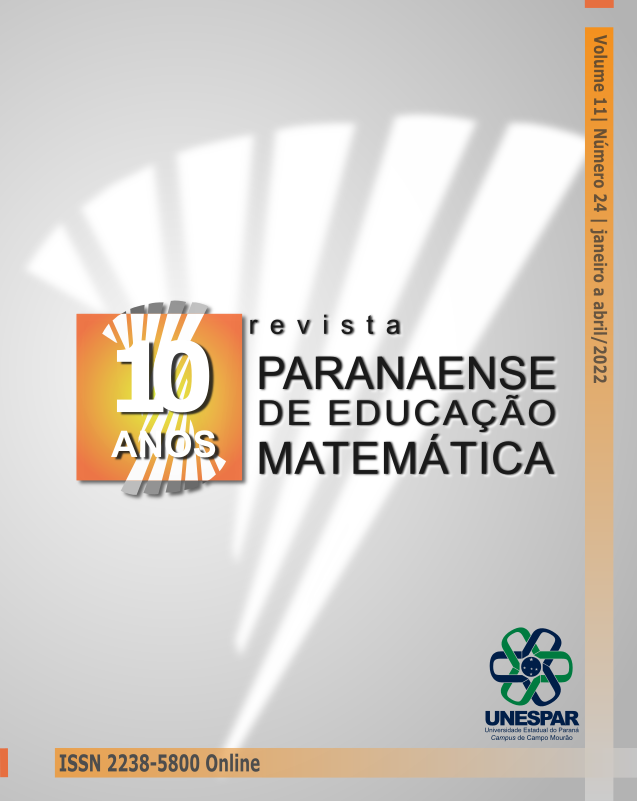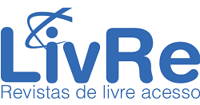MODELING AND PROJECTS: HEALTHY EATING, ENVIRONMENTAL AWARENESS AND PROPOSING A THEME
Abstract
This work presents a proposal of modeling activities designed and implemented in a seventh-level course (12 years old). The activities include three phases: understanding modeling, modeling itself, and formulating modeling projects. These phases are intended to facilitate the modeling process. The activities are contextualized in themes of interest: healthy eating, awareness of the garbage produced, and the third phase, student proposals of a theme and problem. These proposals emphasize the development of contextualized problems where the mathematics emerge naturally from the themes. The aim of the study was to understand the difficulties and potentialities of implementing the modeling activities and was approached through a qualitative research, collecting data from the students' productions, and an interview with the course teacher. Grounded theory was used to analyze the data, from which categories emerged relating to students’ and teachers’ difficulties and potentialities. Results indicate that, on one hand, the proposal allowed students to visualize the mathematical difficulties and thus, support them; on the other hand, working with contextualized situations allowed the students to participate in the activities and develop communication and complementary skills. These activities allowed students to relate mathematics to real-life situations, visualizing its importance and identifying how it can be used in diverse contexts.
Downloads
References
ALMEIDA, L. W.; SILVA, K. P.; VERTUAN, R. E. Modelagem Matemática na Educação Básica. 2a. ed. ed. Sao Paulo: Contexto, 2016.
ARAVENA D, M.; CAAMAÑO E, C. Modelización matemática con estudiantes de secundaria de la comuna de Talca, Chile. Estudios pedagógicos (Valdivia), v. 33, n. 2, 2007.
ARRIETA, J.; DIAZ, L. Una perspectiva de la modelación desde la Socioepistemología. Revista Latinoamericana de Investigación en Matemática Educativa, v. 18, n. 1, p. 19-48, 2015.
BLUM, W. Quality Teaching of Mathematical Modelling: What Do We Know, What Can We Do? In: CHO, S. J. (Ed.). . The Proceedings of the 12th International Congress on Mathematical Education. ICMI. Seoul, Korea: Springer, 2012. p. 73–98.
BLUM, W.; NISS, M. Applied mathematical problem solving, modelling, applications, and links to other subjects ? State, trends and issues in mathematics instruction. Educational Studies in Mathematics, v. 22, n. 1, p. 37–68, fev. 1991.
BORBA, M. C. Tecnologias Informáticas na Educação Matemática e Reorganização do Pensamento. In: BICUDO, M. A. V. (Ed.). . Pesquisa em Educação Matemática: Concepções e Perspectivas. São Paulo: Editora UNESP, 1999. p. 285–295.
BORBA, M. C.; LLINARES, S. Online mathematics teacher education: overview of an emergent field of research. ZDM, v. 44, 2012.
BORBA, M. C.; VILLARREAL, M. E. Humans-With-Media and the Reorganization of Mathematical Thinking: information and communication technologies, modeling, experimentation and visualization. New York: Springer, 2005. v. 39
FERNÁNDEZ-GAGO, J.; CARRILLO YÁÑEZ, J.; CONDE FERNÁNDEZ, S. M. Un estudio de caso para analizar cómo ayudan los profesores en resolución de problemas matemáticos. Educación Matemática, v. 30, n. 3, p. 247–276, 1 dez. 2018.
GALLEGUILLOS, J.; BORBA, M. Expansive movements in the development of mathematical modeling: analysis from an Activity Theory perspective. ZDM, v. 50, n. 1–2, p. 129–142, abr. 2018.
GLASER, B. G.; STRAUSS, A. The discovey of Grounded Theory: strategies for qualitative research. London: Weidenfeld and Nicolson, 1967.
GODINO, J.; BATANERO, C.; ROA, R. Medida de magnitudes y su didáctica para maestros. Universidad de Granada, Departamento de Didáctica de la Matemática, 2002.
GUERRERO, F.; ORTIZ, J. Modelización matemática en Educación Media. Un estudio de competencias en un grupo de estudiantes. Épsilon - Revista de Educación Matemática, v. 29, n. 2, p. 27–40, 2012.
KAISER, G.; SRIRAMAN, B. A Global Survey of International Perspectives on Modelling in Mathematics Education. ZDM, p. 302–310, 2006.
MERRIAM, S. B.; TISDELL, E. J. Qualitative research: a guide to design and implementation. Fourth edition ed. San Francisco, CA: Jossey-Bass, 2016.
MINEDUC. Bases Curriculares 7° básico a 2° medio, 2015. Disponível em: https://www.curriculumnacional.cl/614/articles-37136_bases.pdf. Acesso em: 08/03/2022.
NCTM. Principles and standards for school mathematics - National Council of Teacher of Mathematics. Reston, VA, 2000.
ROCHA, A. P. F. P.; ARAUJO, J. L. Resistências dos alunos em projetos de modelagem. In: ENCONTRO MINEIRO DE EDUCAÇÃO MATEMÁTICA. Juiz de Fora - Minas Gerais: SBEM, 2012.
SAVIANI, D. Do senso Comum a Consciencia Filosófica. São Paulo, Brasil: Cortez Editora, 1985.
SILVEIRA, E.; CALDEIRA, A. D. Modelagem na sala de aula: resistências e obstáculos. Bolema. Boletim de Educação Matemática, p. 1021–1047, ago. 2012.
VILLARREAL, M. E.; ESTELEY, C. B.; MINA, M. V. Modeling empowered by information and communication technologies. ZDM, v. 42, n. 3–4, p. 405–419, jun. 2010.
VILLARREAL, M.; MINA, M. Modelización en la formación inicial de profesores de matemática. Modelagem matemática: pesquisas, práticas e implicacoes para a Educacao Matemática. Anais... In: VIII CONFERÊNCIA NACIONAL DE SOBRE MODELAGEM NA EDUCACAO MATEMÁTICA. Santa Maria - RS: 2013.
WILLIAMS, J.; GOOS, M. Modelling with Mathematics and Technology. In: CLEMENTS, M. A. et al. (Eds.). Third International Handbook of Mathematics Education. Springer International Handbook of Education. [s.l.] Springer, 2013. v. 27p. 1120.
Downloads
Published
How to Cite
Issue
Section
License
Copyright (c) 2022 Revista Paranaense de Educação Matemática

This work is licensed under a Creative Commons Attribution-NonCommercial-NoDerivatives 4.0 International License.










